News
Wellawaya: Where villagers spend sleepless nights afraid of elephant intruders
View(s):- With their only recourse to improvised ‘elephant fences’ villagers call on the government and other stakeholders to find a speedy solution
- Say their villages should be given similar protection to what’s given to the area sugarcane plantations
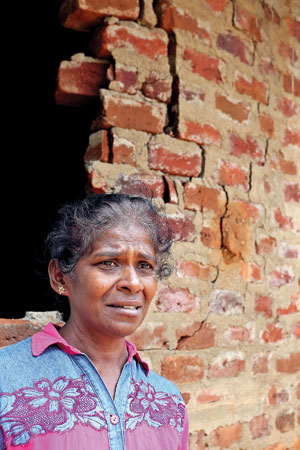
Waiting for compensation: J.A. Premawathi stands in front of her damaged kitchen area
By Anthony David and I.R. Indika in Wellawaya
The villagers here in Demathara, Wellawaya, spend sleepless nights day after day, fearing they would come under attack by a wild elephant roaming the area, but there is no solution in sight for them.
Around each of these houses, located in this village, it is common to see wires that have been strung up around their garden. It is their locally improvised ‘elephant fence’ powered by a solar panel to prevent elephants from intruding into their homes.
Some of the people are lucky as the elephants are distracted by the ‘electric fence’ but some elephants find ways to break in and eventually get into a garden or go on to damage a house looking for paddy or vegetables stored in the kitchen.
“A few weeks ago, a single elephant entered our garden and approached the kitchen area as we had brought our stock of vegetables. We started shouting and lighting crackers, and we managed to keep the animal away. But it returned again and pushed its way partially through the window and reached out to the bag of vegetables,” J.A. Premawathi told the Sunday Times, pointing to the damage caused by the elephant.
“When an elephant enters a garden, even the neighbours find it difficult to come out and help, as all of them are scared for their lives,” she said.
Premawathi managed to build her house after working as a housemaid in Kuwait a few years ago.
“My husband is a kidney patient, and we live in eternal fear. We have to expect that elephants will break into the garden at any time,’ she said.
Like so many other villages, she too had informed the Grama Niladhari and the Wildlife Department a day after the incident. She was given a form to be filled out. Now they have to wait until officials visit the residence and the compensation is calculated. It could take a month to over a year to receive their compensation.
Less than 500 metres away from Premawathi’s residence, a house that was under construction too had come under attack from a single elephant a few days earlier.
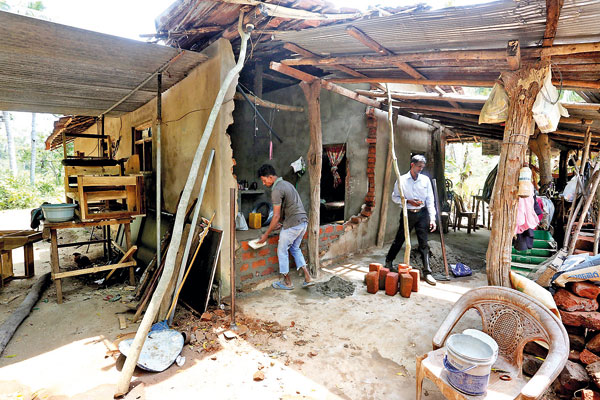
Ms K. Jayasekara: Rebuilding the damaged part of the house. Pix by Indika Handuwala
“We heard the elephant in our garden and tried our best to drive it away, but to no avail, and eventually the house was attacked,’ Ms K. Jayasekara told the Sunday Times.
They too had followed the formalities of filling up the forms and handing them over to the officials, but had opted to go ahead with rebuilding the damaged part of the house.
“It is very common for elephants to come into the villages daily after dusk, and the people usually do not step out at night,” she pointed out. 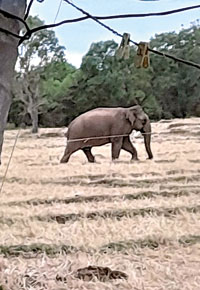
The village has been a settlement since the era of Prime Minister D.S. Senanayake. The villagers say they have been facing the issue of elephants for the past 10 years.
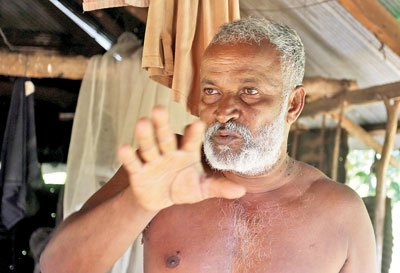
D.A.M. Gunatillake
Among the reasons they believe have aggravated the situation is that large plots of land have been taken over for the sugarcane plantation in the area.
‘In order to protect the sugarcane cultivations throughout the night, tractors are driven around the boundaries of the plantations. As a result, the elephants avoid stepping into the plantations and instead cross over to the villages,” an area resident said.
He said similar measures taken to protect the sugarcane plantations should be extended to villages too.
He said villagers also believe that the expansion of the Kuda Oya Army training camp has had an impact on elephants’ intrusion into villages.
Wildlife officials are underequipped to respond to calls by villagers at night, and in most cases, their calls go without a response.
Several other areas around the Handpanagala tank in Wellawaya and the new settlements that have come up in the area following people being displaced by the Uma Oya project also experience the same situation at night. “Our protection too is the improvised ‘electrical fence’. After 6 p.m., we see elephants roaming around. Fortunately, the elephants have not come into our areas, as these are newly cultivated areas,” D.A.M. Gunatillake said.
Villagers believe that as paddy cultivation in the area improves, due to the Uma Oya water coming their way via Krindi Oya, the human-elephant conflict too will increase.
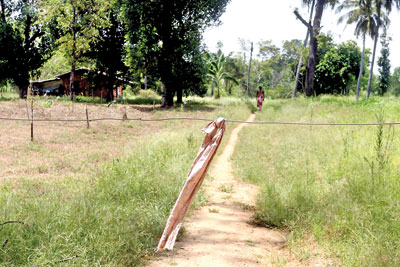
Locally improvised ‘elephant fence’ surrounds the property of a villager
“In most parts of the country where the human-elephant conflict is reported, the people experience the same situation, and it is up to the government to do research and find a suitable solution,” P.S. Hemachandra, an activist representing the interests of those affected by elephants, said.
He said that in some areas of Wellawaya, they have dug trenches so that elephants cannot cross over into the villages, and that has had some success. “Elephants who enter from one area cannot get across as it is a 90 degree slope. This method has been successful, in spite of criticism from some quarters,” he said.
He said that it was essential that the government discuss with the respective stakeholders and come up with solutions.
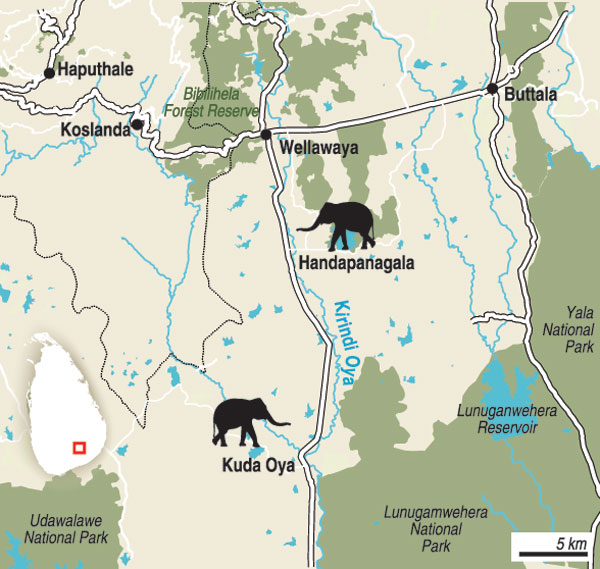
The best way to say that you found the home of your dreams is by finding it on Hitad.lk. We have listings for apartments for sale or rent in Sri Lanka, no matter what locale you're looking for! Whether you live in Colombo, Galle, Kandy, Matara, Jaffna and more - we've got them all!

